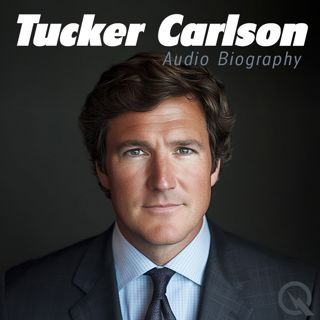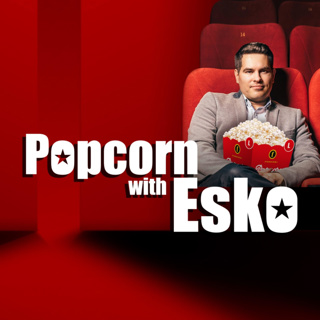
Jon Stewart's Scathing Takedown of Tucker Carlson Shakes Up Political Media Landscape
In a television exchange that has since become legendary, Jon Stewart confronted Tucker Carlson in a manner that transcended the usual decorum of late-night television. The encounter, which took place on CNN's "Crossfire" in 2004, is often euphemistically referred to as Stewart "calling out" Carlson. However, the reality of that interaction was far more impactful and scathing, marking a significant moment in television history where the lines between entertainment and serious political discourse were vividly blurred.Jon Stewart, then the host of "The Daily Show," was ostensibly invited to "Crossfire" as a guest. However, from the outset, it was clear that Stewart had no intention of playing the typical promotional role expected of late-night television hosts in guest appearances. Instead, he seized the platform to deliver a powerful critique, not just of Tucker Carlson, but of the show's format and its contribution to the increasingly divisive political climate.Stewart accused Carlson and his co-host, Paul Begala, of performing "partisan hackery" and not living up to the journalistic responsibility of genuinely informing the public. He lamented that "Crossfire," a show that was ostensibly designed to present political debates to help inform the public, was instead contributing to the rising tide of cynicism within American political discourse. Stewart argued that the show's approach to presenting political issues in a strictly confrontational, binary manner was doing a disservice to its viewers. One of the most memorable moments of the exchange was Stewart directly addressing Carlson, saying, "You're as big a dick on your show as you are on any show." This line, though laced with humor, underscored the seriousness of Stewart's critique, highlighting the personal animus that often colored political reportage on "Crossfire." The directness and seriousness with which Stewart delivered his criticism were unusual for a figure who was primarily known as a comedian, and it took Carlson and the audience by surprise.The fallout from this encounter was significant. Not long after Stewart's appearance, CNN announced the cancellation of "Crossfire," with the network's then-president Jonathan Klein referencing Stewart's criticism as a factor in the decision. Klein noted that the confrontational format Stewart critiqued had indeed been a disservice to the network's viewers.The Stewart-Carlson face-off remains a watershed moment in the intersection of politics, media, and entertainment. It showcased the power of satirical comedy as a form of serious commentary and heralded the rise of figures like Stewart as influential voices in political discourse. The encounter also exemplified the growing disillusionment with traditional forms of political media and their role in a changing society, inspiring a generation to look beyond traditional news sources for their information.Stewart's "calling out" of Carlson was more than just a memorable television spat; it was a direct challenge to the status quo of political reporting and entertainment. It forced a reckoning within the industry about the role of media in shaping political discourse and underscored the responsibility of those who occupy these influential platforms. Furthermore, it highlighted Jon Stewart's unique position in American culture as a comedian who could offer incisive political critique, bridging the gap between entertainment and serious political engagement in a manner that was both unprecedented and profoundly influential.This content was created in partnership and with the help of Artificial Intelligence AI
15 Syys 20243min

"Prominent Thinkers Unpack Pivotal Political Dialogue on Influential Platform"
In a recent development that has caught the attention of political commentators and viewers alike, Victor Davis Hanson offered his insights on an interview conducted by Tucker Carlson with Darryl Cooper. This exchange, discussed on a platform affiliated with the Pepperdine School of Public Policy, has garnered significant attention, amassing over 31,000 views shortly after its release.The crux of this interaction lies in the diverse perspectives brought forward by Darryl Cooper, an insightful voice on political and social matters, under the piercing examination of Tucker Carlson, a figure known for his forthright and often controversial take on issues shaping America. Victor Davis Hanson, a well-respected thinker in conservative circles and an esteemed fellow at the Hoover Institution, known for his prolific work on military history, classics, and modern political commentary, provides a thoughtful analysis on this dialogue, emphasizing its implications and the broader discussions it invokes among the public and political intellectuals.In examining the content of Carlson's interview with Cooper, Hanson touches upon several critical themes that reflect the currents running through American political discourse. Although specific details of their discussion are not provided in the initial report, one can infer from Hanson’s involvement and the profile of the individuals engaged in the conversation, that the topics likely span significant issues affecting the United States, possibly including political polarization, cultural shifts, and challenges to constitutional norms amid a rapidly changing social landscape.The platform where this analysis was shared, associated with the Pepperdine School of Public Policy, suggests an engagement with these themes that is both serious and academic, aimed at fostering a comprehensive understanding of the policies and principles at stake. In a time where public discourse is often fragmented by competing narratives and rapid news cycles, such in-depth discussions and analyses offer a respite and an opportunity for deeper reflection on the fundamental questions facing society.Viewers engaged with the content have not just passively consumed the insights offered by Hanson, Carlson, and Cooper, but have also contributed to the evolving conversation around the topics discussed, as evidenced by the substantial view count and anticipated feedback loops through comments and discussions both online and offline. This interplay between the commentators and the public signifies the vitality of democratic discourse and the continued relevance of engaged, informed debates on the direction in which society is heading.As the discussion initiated by Tucker Carlson's interview with Darryl Cooper, and further examined by Victor Davis Hanson, continues to ripple through the public sphere, it underscores the crucial role that informed commentary and earnest conversation play in shaping the understanding of complex political realities. It stands as a testament to the power of dialogue in bridging divides and fostering a more nuanced appreciation of the challenges and opportunities that lie ahead for the nation.This content was created in partnership and with the help of Artificial Intelligence AI
14 Syys 20243min

Navigating the Media-Politics Intersection: Tucker Carlson's Controversial Kremlin Engagement
Title: The Kremlin's Bold Invitation: Tucker Carlson's Controversial Engagement with PutinIn a bold move that has caught the attention of international observers, the Kremlin has recently signaled its openness to engaging with American conservative pundit Tucker Carlson. This invitation comes in the wake of Carlson's February interview with Russian President Vladimir Putin, an interaction that has stirred considerable discussion regarding the relationships between Western media figures and Russian political leadership.Vladimir Solovyov, a prominent figure within Russia, made a striking comment regarding the anticipation surrounding potential efforts to implicate Carlson in broader political narratives. Solovyov's remark, “I’m waiting for when they try to drag in Tucker Carlson,” resonates with the tense atmosphere surrounding Russo-American relations and the contentious role media figures can play in this global dialogue.Tucker Carlson, known for his conservative viewpoints and critical stance towards mainstream media narratives, conducted an interview with Putin earlier this year. This interview, conducted in Russia, marked a significant moment, illustrating the intricate dance between media and politics on the international stage. The engagement served not only as a platform for Putin to articulate his perspectives to an American audience but also highlighted the complexities of media diplomacy in today's geopolitical climate.The interview has since been a subject of extensive analysis, with experts examining the implications of such direct communication between an American media figure and the Russian president. It raises questions about the nature and impact of engaging with controversial leaders through the lens of media, as well as the potential repercussions for individuals like Carlson who find themselves at the intersection of journalism and international politics.Solovyov's comment underscores a broader anticipation for the consequences that may befall Tucker Carlson following his high-profile interaction with Putin. It hints at the potential for Carlson to become entwined in the intricate web of political maneuvering and public relations strategies that characterize relations between the United States and Russia.This situation serves as a poignant reminder of the power of media in shaping public perception and foreign policy. As figures like Carlson engage with leaders such as Putin, the implications of such interactions reverberate far beyond the immediate moment, potentially influencing diplomatic relations and shaping the discourse around international issues.As the international community watches closely, the unfolding dynamics between media personalities like Tucker Carlson and political leaders on the world stage will undoubtedly continue to spark debate and analysis. This scenario illustrates the evolving nature of global diplomacy, where media and politics intersect with profound consequences for international relations and public understanding.This content was created in partnership and with the help of Artificial Intelligence AI
12 Syys 20243min

"Clash of Conservative Giants: Tucker Carlson and Glenn Beck Set to Captivate Audiences in Salt Lake City Live Tour"
In a major event that is already generating significant buzz, Tucker Carlson, the prominent conservative political commentator, is set to take the stage in Salt Lake City, Utah. This live tour, which is anticipated to captivate audiences, also features the well-known media personality Glenn Beck. Known for their influential voices in conservative circles, both personalities are expected to draw substantial crowds. Additionally, the event has sparked interest due to its inclusion of paid partnerships, hinting at high-profile collaborations and significant backing.Tucker Carlson, a figure synonymous with bold political commentary and thought-provoking discussions, has been a staple on American television for years. His nightly talk show on Fox News, "Tucker Carlson Tonight," has reached millions of viewers, making him one of the most recognizable faces in political commentary. His willingness to tackle controversial subjects and question mainstream narratives has earned him a dedicated following.Glenn Beck, another heavyweight in conservative media, brings his own unique perspective to the table. Beck, who has had a diverse career as a radio host, television producer, and founder of TheBlaze, a conservative news and entertainment network, is known for his impassioned and often polarizing takes on American politics and culture.The collaboration between Tucker Carlson and Glenn Beck for the live tour in Salt Lake City is a noteworthy event for supporters and critics alike. It represents a merging of two influential forces in conservative media, likely to offer compelling and dynamic discussions on the stage. The precise topics to be covered remain a point of speculation, but given both commentators' history, it's anticipated that the event will delve into current political climates, policy discussions, and possibly even predictions for future American political shifts.The mention of paid partnerships in the announcement adds another layer of intrigue to the event. While specific details about these partnerships haven't been disclosed, it's clear that such backing could elevate the event's profile further, possibly offering attendees an even more enriched experience. Partnerships could range from sponsorships with conservative-aligned organizations to collaborations with media entities, amplifying the event's reach and impact.Social media platforms, especially Twitter, are already abuzz with anticipation, as the announcement was made with an eye-catching image that quickly spread across the internet. This digital word-of-mouth has played a significant role in generating early interest, underlining how influential online platforms continue to be in shaping political discourse.As the date approaches, all eyes will be on Salt Lake City to see what Tucker Carlson and Glenn Beck have in store. The event promises not only to be a significant gathering for conservative voices but also a potentially pivotal moment in American political commentary. For many, it will be a rare opportunity to see two leading conservative commentators share their insights live, in what is expected to be a candid and unfiltered format.This content was created in partnership and with the help of Artificial Intelligence AI
10 Syys 20243min

Tucker Carlson's Controversial Exclusion of Stew Peters Sparks Debate in Conservative Media Landscape
In a move that has stirred notable controversy within conservative circles, Tucker Carlson, the prominent political commentator known for his prime-time show on Fox News, has explicitly refused entry to Stew Peters, a fellow right-wing talk show host, at a highly anticipated event scheduled for tonight. This decision has ignited a flurry of discussions and debates across various media platforms, underscoring the existing divisions and the complex landscape of conservative media personalities.Tucker Carlson, whose influence extends beyond his television audience to a vast number of followers on social media and various digital platforms, has long been a polarizing figure. Known for his outspoken and often controversial takes on political and sociocultural issues, Carlson's stance and viewpoints have cemented his position as a leading voice within conservative media circles. His decision to bar Stew Peters from attending his event is particularly significant, given Peters' own reputation for engaging in divisive and provocative discourse, often echoing and amplifying the conservative sentiments shared by Carlson's viewer base.The reasons behind Carlson's refusal to allow Peters entry have not been explicitly detailed, leaving room for speculation and conjecture. This has led to intense speculation about potential rifts or ideological divergences within the right-wing media ecosystem, a sector known for its traditionally united front against liberal counterparts. The absence of a clear explanation for this exclusion has prompted discussions regarding the boundaries of acceptable discourse within conservative circles and whether Carlson's decision marks a new phase of gatekeeping within this community.Stew Peters, for his part, is a figure who has garnered both support and criticism for his often contentious and conspiracy-leaning commentary. His exclusion from an event led by a fellow conservative heavyweight like Tucker Carlson raises questions about the criteria for inclusion within mainstream conservative events and whether ideological purity tests are being applied more stringurally within these circles.The reactions to this development have been mixed, with some applauding Carlson for drawing a line against what they perceive as extreme or detrimental elements within their own ranks, while others decry what they view as unnecessary gatekeeping that stifers free speech and open dialogue. This incident highlights the ongoing tensions within the conservative media sphere, tensions that reflect broader political and ideological divisions within American society.As the conservative community grapples with these internal dynamics, the incident serves as a reminder of the challenges facing a movement striving to present a united front while accommodating a spectrum of voices and viewpoints. The fallout from Carlson's decision is likely to reverberate for some time, prompting both reflection and debate about the direction of conservative discourse in the United States.This content was created in partnership and with the help of Artificial Intelligence AI
8 Syys 20243min

Controversial WWII Revisionism Sparks Outrage on Tucker Carlson Show
In a controversial move that has stoked significant debate and concern, Tucker Carlson, the conservative political commentator known for his polarizing views, recently hosted a figure on his show that has caused a stir across various sectors of society. Darryl Cooper, who appeared as a guest, is described as a "revisionist historian," a term that often signals a deviation from established historical consensus. During this segment, Cooper presented a version of World War II history that has raised eyebrows for what many are characterizing as a dangerous distortion of factual events.The episode in question saw Cooper promulgate a narrative of the Second World War that seemingly reserves judgment or even reinterprets the actions and roles of key figures and nations involved in the conflict. This approach to historical analysis is fraught with concerns, primarily because it can lead to a misunderstanding of the causes, nature, and consequences of the war. Revisionism, in the context of historical scholarship, often involves re-examining historical records and, in some cases, challenging orthodox views. However, it becomes contentious when it seeks to drastically alter widely accepted facts without substantial evidence, potentially whitewashing or minimizing the atrocities committed during such conflicts.World War II, a pivotal event in modern history, involved complex geopolitical dynamics and led to the loss of millions of lives, including the horrific events of the Holocaust. The attempt to reinterpret the actions and decisions of the Axis powers, if done without rigorous scholarly evidence and nuanced understanding, can trivialize the suffering of those who were victimized during the war years. Furthermore, it can also have a dangerous impact on public understanding of historical events, potentially fueling ideologies that have been widely discredited and condemned.The choice of Tucker Carlson to host a figure like Cooper and to explore such a contentious version of World War II history has, unsurprisingly, drawn criticism from historians, educators, and advocacy groups who emphasize the importance of accurate historical representation. Critics argue that giving a platform to revisionist narratives on mainstream media outlets can lend undue legitimacy to fringe theories that often lack the rigorous evidence and scholarly agreement surrounding historical events.The repercussions of airing such viewpoints extend beyond the academic community. They can influence public perception, potentially altering the way society remembers and learns from the past. This, in turn, underscores the responsibility of media figures and outlets in shaping public discourse. While the exploration of alternative viewpoints is a hallmark of free speech and intellectual inquiry, critics maintain that it is essential to distinguish between legitimate scholarly debate and the dissemination of narratives that can misinform or distort historical understanding.As discussions around this broadcast continue, the incident serves as a reminder of the ongoing debates surrounding media, historical interpretation, and the power of narratives in shaping our understanding of the world. The balance between free expression and the responsibility to provide accurate, evidence-based information remains a key challenge for broadcasters and commentators across the political spectrum.This content was created in partnership and with the help of Artificial Intelligence AI
7 Syys 20243min

"Unraveling the Controversial Claim: Did Winston Churchill 'Ruin Europe'?"
In a recent enlightening video, Dr. Mohler took to the stage to address and dissect an argument that has been circulating widely, notably put forward by "The Tucker Carlson Show." The crux of this argument is a bold and contentious assertion that Winston Churchill, a figure often revered for his leadership during World War II, essentially "ruined Europe."Winston Churchill, the indomitable British Prime Minister who served during the crucial years of World War II, is celebrated for his unwavering resolve against Nazi Germany, his oratory prowess, and his indelible mark on history as a key architect of Allied victory. Yet, the perspective offered by Tucker Carlson posits a controversial reevaluation of Churchill's legacy, suggesting that his decisions and policies during the war led to long-term detrimental effects on Europe.Dr. Mohler, known for his insightful analysis and erudite commentary on contemporary issues and historical events, meticulously breaks down this argument, examining its premises and its implications. The debate at the heart of this discourse touches on several pivotal aspects of European history, geopolitical dynamics, and the outcomes of wartime decisions.One can anticipate that Dr. Mohler's analysis goes beyond a mere rebuttal or affirmation of the claim presented by "The Tucker Carlson Show." It likely delves into the complexities of Churchill's leadership, the unavoidable harshness of wartime decisions, and their multifaceted consequences on post-war Europe, including the geopolitical division of the continent in the Cold War era, the reconstruction challenges, and the legacy of colonialism.Furthermore, this debate opens up broader questions about historical legacy and interpretation. It invites a reflection on how pivotal figures are remembered and assessed, the criteria used to judge their actions, and the importance of context in understanding historical outcomes. The polarizing views on Churchill's impact underscore the nuanced and often contentious nature of historical analysis.For those intrigued by history, politics, and the intricate dance of leadership and legacy, Dr. Mohler's response to the argument put forth by Tucker Carlson provides a compelling and thought-provoking examination. It serves as a reminder of the complexities surrounding influential historical figures like Winston Churchill and the profound, sometimes divisive, interpretations of their legacies. This dialogue between modern commentators and historical legacies enriches public discourse, encouraging a deeper understanding and critical engagement with our past.The original argument and Dr. Mohler's response, available through his video commentary, offer valuable insights and a basis for further reflection and debate among historians, political scientists, and the general public interested in the enduring questions of leadership, morality, and the impact of decisions made in the crucible of history.This content was created in partnership and with the help of Artificial Intelligence AI
5 Syys 20243min

"Tucker Carlson's Unexpected Podcast Crossover: Exploring Political Insights with Comedian Theo Von"
In an intriguing crossover of media personalities, Tucker Carlson, a prominent figure known for his contributions to political commentary, recently took part in an engaging episode of "This Past Weekend," a podcast hosted by the renowned comedian and host, Theo Von. The episode, marked as number 468 in the show's continuing series, has garnered significant attention and amassed over 10 million views, showcasing the high level of interest in the collaboration between these two distinct voices.The episode, which runs for approximately one hour and eighteen minutes, offers a unique blend of Carlson's sharp political insights with Von's comedic and offbeat approach to discussions, providing audiences with a compelling and entertaining format. Carlson, known for his bold and often polarizing opinions, finding himself in the laid-back and often improvisational environment of Von's podcast, created an atmosphere that allowed for a different side of the political commentator to emerge."This Past Weekend" is well-known for inviting guests from various walks of life, including comedians, artists, and now, media personalities like Tucker Carlson, to delve into wide-ranging topics from personal life stories to broader societal issues. Theo Von, with his distinctive humor and charm, has a way of navigating conversations that bring out both the lighter and more profound perspectives of his guests, making the podcast a hit among listeners looking for depth as well as entertainment.Given Tucker Carlson's extensive background in political commentary, his appearance on a platform like Theo Von's podcast indicates a blending of genres that is becoming more common in today's digital media landscape. This crossover not only reflects the versatility of both hosts but also signals a growing trend where audiences seek content that breaks the conventional molds of entertainment and information delivery.As "This Past Weekend" with Theo Von continues to break the mold by bridging comedy with serious dialogue, episodes like the one featuring Tucker Carlson prove that there is a significant appetite for content that can simultaneously inform, challenge, and entertain. With over 10 million views, this episode stands as a testament to the success of such innovative approaches in captivating and engaging a broad audience.This content was created in partnership and with the help of Artificial Intelligence AI
3 Syys 20242min





















